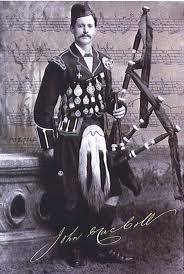Annotation:John MacColl's Farewell: Difference between revisions
m (Text replace - "[[{{BASEPAGENAME}}|Tune properties and standard notation]]" to "'''Back to [[{{BASEPAGENAME}}]]'''") |
Alan Snyder (talk | contribs) (Fix citation) |
||
| Line 2: | Line 2: | ||
---- | ---- | ||
<p><font face="garamond, serif" size="4"> | <p><font face="garamond, serif" size="4"> | ||
'''JOHN MACCOLL'S FAREWELL'''. AKA | '''JOHN MACCOLL'S FAREWELL'''. AKA – "[[Second Regiment Scottish Horse]]", "John MacColl's Farewell to the Scottish Horse." Scottish, Pipe March (2/4 time). B Minor. Standard tuning (fiddle). AABB'. Glasgow-based John MacColl (1860–1943) was a 20th century Highland dancer, piper, fiddler and composer of Highland pipe music, renowned for his 2/4 marches. MacColl was born at Kintallen, Oban. He was taught by ear by his piper father, and later took lessons from Pipe Major Ronald Mackenzie at Fort George, gaining such skill (according to the '''Celtic Monthly''' magazine of 1900) that between 1882 and 1900 he won upwards of two thousand prizes in his lifetime (as if that weren't enough, MacColl also won prizes for running, leaping and golf). Paul Stewart Cranford (2000) notes that MacColl’s student, Sandy Boyd, brought MacColl's music to Cape Breton and was very influential. The march has been recorded frequently by Cape Breton fiddlers. "John MacColl's Farewell to the Scottish Horse" is the name of a well known 6/8 march by John McColl. The "Farewell to the Scottish Horse" name was apparently applied in error to this tune, perhaps first in the Logan Collection, where it may have been swapped with "Second Regiment Scottish Horse". | ||
<br> | <br> | ||
<br> | <br> | ||
</font></p> | </font></p> | ||
[[File:maccoll.jpg|200px|thumb|left|John MacColl (1860–1943)]] | |||
<p><font face="garamond, serif" size="4"> | <p><font face="garamond, serif" size="4"> | ||
''Source for notated version'': | ''Source for notated version'': | ||
| Line 13: | Line 13: | ||
</font></p> | </font></p> | ||
<p><font face="garamond, serif" size="4"> | <p><font face="garamond, serif" size="4"> | ||
''Printed sources'': Brown ('''The Bagpipe Music of John MacColl'''), Cranford ('''Jerry Holland: The Second Collection'''), 2000; No. 66, p. 27. | ''Printed sources'': | ||
Brown ('''The Bagpipe Music of John MacColl'''), 2006; p. 41 (as "Second Regiment Scottish Horse"). | |||
Cranford ('''Jerry Holland: The Second Collection'''), 2000; No. 66, p. 27. | |||
<br> | <br> | ||
<br> | <br> | ||
</font></p> | </font></p> | ||
<p><font face="garamond, serif" size="4"> | <p><font face="garamond, serif" size="4"> | ||
''Recorded sources'': <font color=teal>Jerry Holland | ''Recorded sources'': | ||
<font color=teal> | |||
Jerry Holland – "Master Cape Breton Fiddler" (1982). | |||
</font> | |||
<br> | <br> | ||
<br> | <br> | ||
| Line 27: | Line 32: | ||
</font></p> | </font></p> | ||
<br> | <br> | ||
<br> | <br style="clear:both"/> | ||
---- | ---- | ||
'''Back to [[{{BASEPAGENAME}}]]''' | '''Back to [[{{BASEPAGENAME}}]]''' | ||
Revision as of 05:04, 4 March 2017
Back to John MacColl's Farewell
JOHN MACCOLL'S FAREWELL. AKA – "Second Regiment Scottish Horse", "John MacColl's Farewell to the Scottish Horse." Scottish, Pipe March (2/4 time). B Minor. Standard tuning (fiddle). AABB'. Glasgow-based John MacColl (1860–1943) was a 20th century Highland dancer, piper, fiddler and composer of Highland pipe music, renowned for his 2/4 marches. MacColl was born at Kintallen, Oban. He was taught by ear by his piper father, and later took lessons from Pipe Major Ronald Mackenzie at Fort George, gaining such skill (according to the Celtic Monthly magazine of 1900) that between 1882 and 1900 he won upwards of two thousand prizes in his lifetime (as if that weren't enough, MacColl also won prizes for running, leaping and golf). Paul Stewart Cranford (2000) notes that MacColl’s student, Sandy Boyd, brought MacColl's music to Cape Breton and was very influential. The march has been recorded frequently by Cape Breton fiddlers. "John MacColl's Farewell to the Scottish Horse" is the name of a well known 6/8 march by John McColl. The "Farewell to the Scottish Horse" name was apparently applied in error to this tune, perhaps first in the Logan Collection, where it may have been swapped with "Second Regiment Scottish Horse".

Source for notated version:
Printed sources:
Brown (The Bagpipe Music of John MacColl), 2006; p. 41 (as "Second Regiment Scottish Horse").
Cranford (Jerry Holland: The Second Collection), 2000; No. 66, p. 27.
Recorded sources:
Jerry Holland – "Master Cape Breton Fiddler" (1982).
See also listings at:
Alan Snyder's Cape Breton Fiddle Recording Index [1]
Back to John MacColl's Farewell
